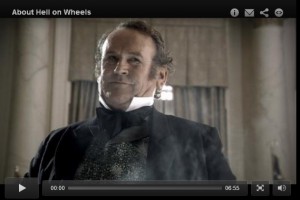Please Pardon My Progress
The Wee Little Minds Behind “Hell on Wheels”
“..the battle of man scarring nature, verses, this, the beauty of nature..”
“..in some ways it’s an anti-western..”
“..hell on wheels is dragging the urban blight and the industry of the east across the west and changing it for ever; it’s kinda the beginning of the west as we — they — know it..”
So begin lamentations of the producers and directors of “Hell on Wheels,” AMC’s lush new chronicle of Thomas C. Durant’s transcontinental railroad construction.
There’s something perfunctory about the way these gentle, urban white guys perform their anti-Western ablutions, as though the closed-captioning should read “heah, dude, we’re going to do a western with lots of murder in the camp and hot chicks in a brothel, and all that, but, heah, we know the Indians were really bummed by all of this..I mean really bummed.”
Is it any wonder the Occupy Generation looks a little nutty? AMC’s introduction to their new series contained one small moment of sanity which the editors appeared to have missed, when executive producer Joe Gayton observed: “it (the expansion of the railroads across the west) was really very much like JFK’s, um, idea that we go to the moon by the end of the Sixties.”
Bingo.
It’s called progress. Technical progress. Economic progress. The bending of nature to meet man’s needs, to expand his world and make it more comfortable, more prosperous, more likely to put lots of food on the table.
The vast North American continent may indeed have appeared virginal, but the western sunsets went down on centuries of aboriginal savagery, infanticide, head-hunting and cannibalism. For whatever hypocrisy and urban density that might have arrived with the smoke and the steel, there was a world of pagan brutality that came to an end as well.
And it’s not just a reality confined to the clash of Europe verses North American aboriginals. It’s really the story of Western civilization itself. For whatever perils modern Britain may present, I would infinitely prefer a visit to modern day Yorkshire over being the guest of honor, and main course, at a pre-Christian, Druid campfire.
Entertainment that celebrates the west — that tells a story built on the “common sense” the Judeo-Christian standard made “common” — has a great deal to do with why we started Colony Bay, and, plainly, it’s one of the reasons we lament the amount of money going to the wee little minds who conceptualized “Hell on Wheels.”
As one of the producers observed “it’s not your father’s western.”
We know.

